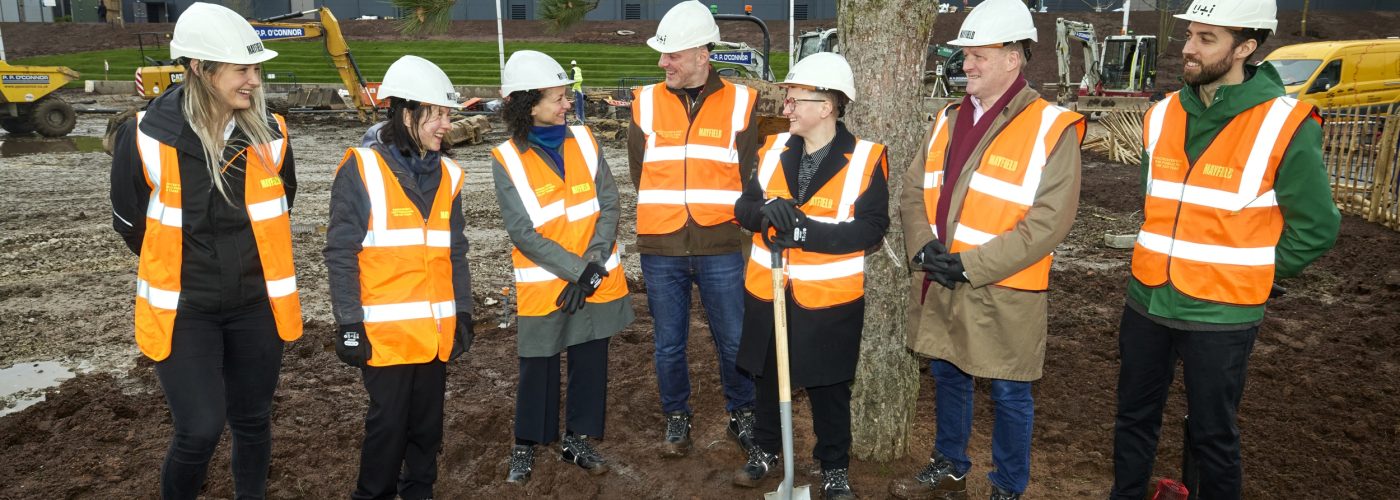New 6.5 acre park opening in autumn will be an urban oasis
Re-use of materials, tree planting and sustainable irrigation to save hundreds of tonnes of CO2
MAYFIELD, Manchester’s landmark regeneration development, is setting a new standard for sustainability, helping the city meet its ambitious target of becoming zero carbon by 2038, 12 years ahead of the Government’s target for the rest of the UK.
Analysis commissioned by The Mayfield Partnership reveals the positive environmental impact the development is already having on the city centre, and which will only increase over time.
The biggest environmental gain so far has been achieved through recycling and reusing materials during the construction of Mayfield Park, which has saved between 230-240 tonnes of CO2 alone. One tonne of CO2 is the equivalent of driving more than 3,700 miles in a diesel car, or a single flight from Paris to New York.
The project team has reused the steel from a former concrete culvert over the River Medlock to make one of the three pedestrian bridges in the Park. In addition the use of reclaimed bricks, structural steel beams and river walls has also contributed to the saving.
Around three quarters of the 140 new trees have now been planted at the 6.5 acre Mayfield Park, which is the due to open this autumn. The new mature and semi-mature trees which are creating a stunning, biodiverse natural landscape in an area of the city where few trees have ever been grown before, will remove more than three tonnes of CO2 (equivalent) from the atmosphere per year.
The amount of carbon annually captured will increase over time as the trees grow and flourish in the Park.
Re-using water from the Victorian wells, discovered during the construction of the Park, as a sustainable source of irrigation for trees and plants will also make a significant contribution to Mayfield’s sustainable credentials, saving approximately 1 tonne of carbon per year and up to 3 million litres of water per year.
The 10-year, £1.4bn project to transform the previously run-down 24-acre industrial site near Manchester Piccadilly Station into a thriving urban neighbourhood, is one of the North’s largest regeneration projects, comprising 1,500 homes, 1.6m sq ft of market-leading commercial space and 300,000 sq ft of retail and leisure facilities.
Arlene Van Bosch, Development Director at regeneration company U+I, which is delivering the Mayfield project alongside its partners Manchester City Council, developer LCR and Transport for Greater Manchester, said: “Mayfield Park will be a beautiful, green haven in the city centre and ahead of the formal opening later this year, we’re very pleased to be contributing to Manchester’s low carbon agenda..
“We have worked incredibly hard with our contractors and with the Environment Agency to make Mayfield an exemplar in sustainability as well as a place for all to enjoy and it’s great to see wildlife such as Canada Geese and Kingfishers returning to the riverside after many years of pollution and dereliction.”

Cllr Bev Craig, Leader of Manchester City Council who recently planted a tree at Mayfield Park said: “As a local authority we are planting more than 1,000 trees across the city this year. Mayfield Park will be an amazing addition to our city centre and I am delighted to see how sustainability has been such a focus as we collectively rise to the challenge of addressing the climate crisis.”
During the Industrial Revolution Mayfield was at the beating heart of Cottonopolis – as Manchester was then known. High levels of pollution from coal-burning cotton mills and workers’ homes at Mayfield meant the area was inhospitable to trees and most plant life.
Alongside the new trees in the Park, I40,000 bulbs, shrubs and bushes are being planted and the new lawns have been laid. In 2020, the UK Government pledged £23m of investment from its Getting Building Fund – one of the largest investments in any single project – to Mayfield Park. This investment, delivered through the Greater Manchester Combined Authority, is part of the Government’s strategy to support ‘shovel ready’ schemes that will help to drive economic recovery following the COVID-19 crisis





